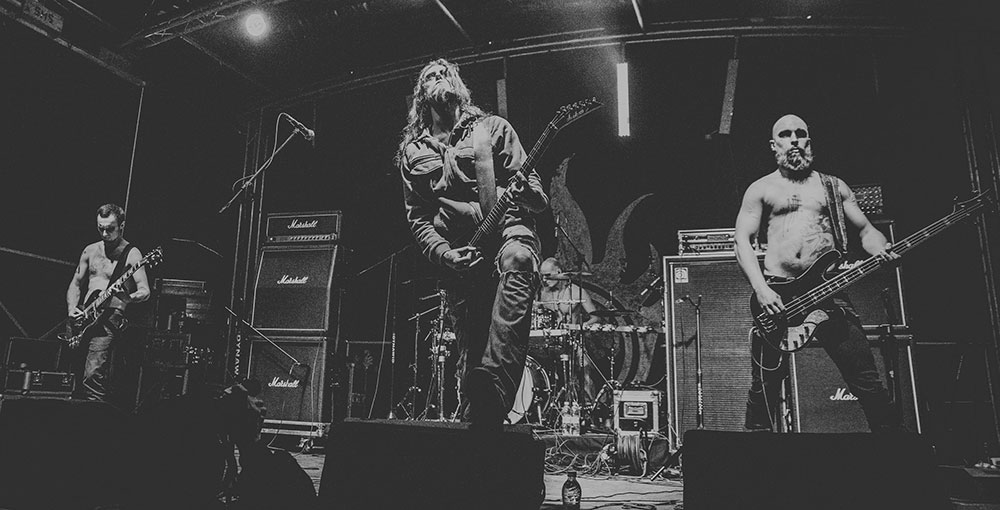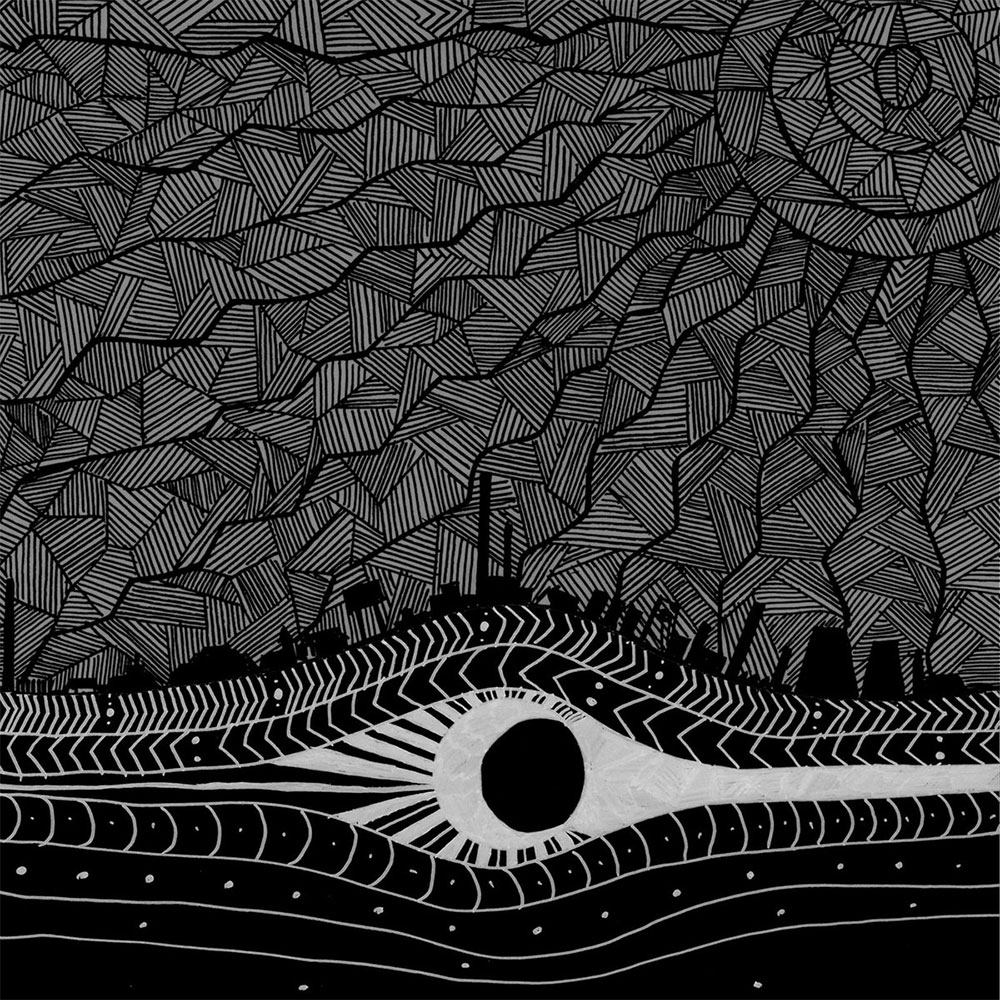Furia
2017-03-29
by Niklas Göransson
Lunar tunes born of a light emanating from the cavernous darkness; Poland’s Furia dwell on their nation’s turbulent past, and speak of how they were chosen as wedding band for the marriage of beauty and bleakness.
FURIA’s label describes their sound as trademarked ’nekrofolk’, a description I wouldn’t necessarily argue against. The music is actually quite hard to define – especially within a traditional black metal framework, so I’m curious from whence the inspiration of their non-traditional facets come and if this is a concerted effort to distinguish themselves from the crowd.
– Assuming it to be easier, says guitarist and vocalist Nihil, I instead tried listening to our music for influences from traditional black metal elements. It’s interesting because I realised how difficult it is; I can barely hear any at all. Now imagine for a moment that “Księżyc milczy luty” (fifth album, 2016) was our debut, that we had recorded nothing in the past, played no gigs and never used make-up. Would you call it black metal, without this whole context?
Most probably not.
– Me neither. Okay, so you probably hadn’t heard of us before our last album. However – you did your research, read articles, looked at photos, watched videos etcetera. Now, to the point; inspiration. It is not true that we’re trying to craft unique music, it’s quite the opposite. But metal in general focuses on unoriginality and with that background FURIA might very well appear exceptional, or at least as if we’re trying to come off that way.
Nihil mentions his proclivity to study black metal from an anthropological perspective, which has led him to the conclusion that it’s not so much about originality as it is developing existing concepts.
– It became fusty a long time ago, all that innovative character is just chintzy illusion. Maybe there are exceptions, I don’t know, but it’s not a problem reserved for black metal; that’s postmodernism for you. The more I explore the genre, the more I’m convinced that we’re just calling on the past – nothing new here. Musically, we might try to be special, but for me it’s about creating an appropriate twenty-first century costume for the same vessel. We are anti-unique, it’s about the core ideas.
The promo sheet states that the conceptual aspects of “Księżyc milczy luty” gravitate towards the lunar, and hence I wonder if Nihil believes its cyclical phases to exert any influence over us. Many scoff at this notion, but it’s interesting to consider how the ebb and flow of oceans are dictated by the moon – then note that our bodies consist of about sixty percent water.
– Of course it has power over humans, this is not my opinion but a fact. Water is a good example and I believe the reason is gravity, simple physics. Criminology is another interesting aspect of this matter; statistically, more crimes are committed during the full moon. I don’t remember how they explain this but it’s evident.
There’s actually no scientific consensus for what’s commonly known as the ‘lunar effect’, which moves a variety of living creatures both physically and mentally. This is no recent observation, bearing in mind the term ‘lunacy’ which derives from the Latin word lūnāticus – ‘moonstruck’.
– However, physical attraction of celestial bodies does not concern lyrical content. On the other hand, evenings when the moon is closer and stronger are somehow different – night seems larger than usual, which creates a distinct atmosphere. Maybe this gravity-induced altered state has something to do with my perception on that theme, I don’t know.
From what I’ve been able to determine, Nihil is the driving force behind FURIA – yet I couldn’t find a single interview with him. He’s also acting ‘frontman’, in the capacity of vocalist; I’ve watched a few live videos and he’s not exactly chattering away between numbers. This leads me to believe that the man is perhaps not all that fond of the spotlight.
– This is weird because I actually like being the centre of attention, but I don’t enjoy talking to strangers. Expressing art is one thing, but when it comes to my person I’m an introvert. Another problem is that questions are usually misguided. But most important is that I have nothing more to say, music is my primary language which is why I don’t have passion for interviews. On the other hand, this is promotion for the band.

In our pre-interview email exchange, Nihil assured me that his lyrics are entirely impregnable for a non-Polish speaker and basically urged me not to bother. Rarely one to shy away from pesky inquisitiveness, I insist that surely there must be some hint to disclose beyond what can be deciphered from online translations.
– Lyrics are about us, we use music to convey things and in reverse study it for knowledge about ourselves. Maybe this is not satisfying answer, but the most accurate one. Of course I understand how it might be a problem for foreigners like yourself but if you want more, just trust your intuition – or move to Poland. The former option should be sufficient.
Seeing how Nihil earlier in the conversation stated resolutely that FURIA’s concept is paramount in everything they do, I remain somewhat confused over of his stubborn refusal to discuss it.
– There are two reasons for our frugality on this matter. First of all, people nowadays are used to having everything served on a plate – I hate that, it lessens and degrades us. Not applying your own energy to grasp knowledge renders it valueless. Second thing is, it’s really not necessary; listen properly and I believe the essence will find its way to you, even if you don’t speak Polish.
What then would be the optimum listening practice to seek conceptual gnosis?
– I have no immediate answer for that, this is a task for those who are actually interested in our music. I suppose it can be embraced by instinct as we, the inhabitants of this world, are all the same organism and there is one universal language – but it’s hidden. The main obstacle is that much of FURIA concerns Polish reality and history, or rather the result of the two which is our mentality. These aspects cannot be comprehended without learning about Poland, which is a very complex nation.
One would imagine that many of the traits that characterise the Polish are a result of their age-old custom in dealing with troublesome territorial predation.
– Our entire history is one of constant fighting on different scales, but I don’t know if that’s why we’re this way or if the past was shaped by our conflictive nature. Probably both. Our main problem is that in times of peace we revert to doing battle amongst ourselves, so maybe there’s no need for hungry neighbours – that I cannot answer either.
Nihil points out how the nation has endured invasions, annexations and occupations from an assortment of conquerors under various eras – none especially pleasant for the native populace.
– We are a strong but also very chaotic nation. You should watch television in Poland, or go to the club on a Friday night. This is interesting because it shows normal people who supposedly espouse positive values, but in reality act the opposite.
The Polish, he says, harbour a lot of inherent hatred and aggression – qualities mirrored in their black metal output. The classic nineties scene; GRAVELAND, PROFANUM, FULLMOON, INFERNUM and so on – all of them shared a rather distinct sound that was arguably epitomised with VELES’ ”The Triumph of Pagan Beliefs” demo and ”Night on the Bare Mountain” debut. Nihil offers his rather unromantic musings on its origins.
– The bands you mention were all closely related, so it was natural for them to play like that – my guess would be that it was a kind of coincidence and not a tale to discern anything exciting from. Someone recorded successful stuff, inspired by Scandinavian music but in Polish vein and with different sound, this determined the shape and form of music that followed.
Past articles on Bardo Methodology have seen plenty of discussion about the climate of nineties black metal gigs in a variety of European countries. Come to think of it, I don’t recall ever hearing much about what the Polish scene was like for those on the ground.
– I began listening to black metal around 1996 so the most important years had already passed by then, yet this special atmosphere lasted until the early 2000s. As TT said in the ABIGOR interview, it was kind of a dangerous experience to be part of metal events. Especially in Poland I guess, the mosh-pits were really, really brutal.
Many touring musicians still to this day mention Poland as one of the best locations to play in Europe, due mainly to the riotously enthusiastic audiences.
– I remember the mosh-pit at Metalmania festival for example, where about a thousand people were almost fighting. Also, I recall this overall belief of being the wildest scene in Europe and this was triggering a sense of superiority in the minds of Polish metalheads.

I was informed that Nihil is very interested in Silesian folklore, which from my understanding is the region of Poland FURIA hails from. I attempted to read up on it online in order to provide some riveting narrative, but was unable to find anything not directly involving traditional folk costumes.
– To be honest, I don’t believe I could explain what Silesia and its folklore is – the best I can do is offer a few facts as signpost in understanding the issue. This region is a mixture of Polish, Czech and German influences and nationalities. It is the country’s most industrial region and until modern times, most Silesians worked in the area’s numerous coal mines. The surrounding nature is stunning though.
This, he says, is the key to Silesian charm – the seamless intermingling of beauty and bleakness.
– It’s the land of stark contrasts in every perceivable way. Rusted ironware in green gardens, blackened days under ground, overwhelming dirt – and clean, forthright Silesian soul. Colourful, simple folklore and strong artistic avant-garde underground.
This would at least in part explain something else I was going to ask about – their 2016 EP “Guido” was supposedly recorded three hundred metres below ground in an abandoned mine.
– Yes, coal mines are natural environments for us. I don’t mean we work as miners but referring to Silesian everyday reality. The purpose was to accomplish a kind of circle, because many years ago the power fuelling improvised songs erupted from this black underground as a colourful rainbow – we brought that light back.
You’re going to have to explain that one.
– I mean that the energy of these compositions flows from the past, because the EP songs “Hahary”, “Łączka” and “Lew Albinos” are all our improvised interpretations of paintings by the same titles. We wanted to keep it secret as it’s kind of an intimate thing for us, but people discovered and spread it.
Nihil explains that these works were produced in the forties by an obscure collective of artistic miners.
– They lived in darkness, spending their days underground and so didn’t catch much sunlight. Their paintings were really colourful though, I think it was their way of maintaining some balance in life. So this was us pouring some of that colour, or light if we can say so, back into the depths where it originally emanated from.
Preparing for this article I observed that FURIA appear to enjoy much higher popularity in Poland than abroad.
– That is correct, the imbalance is significant in this matter. We have some plans on broadening our horizons but there will be only a few gigs outside of Poland this year because we’re currently preparing for spectacle in The National Old Theatre of Kraków. It’s an extremely interesting project, so we’ve chosen to focus on that.
In 2016, a famous Polish theatre director and playwright named Jan Klata came across FURIA’s music and liked it so much that he reached out to them. The result of this alliance is a re-enactment of a 1901 play called Wesele, which translates to ‘The Wedding’ and tells the tale of a nation’s struggle for independence – severely hampered by complications in collaboration.
– It deals with everything I spoke of earlier; Polish problems, our history, mentality, and so on. We’ve been cast as a wedding band, and will be performing our own songs – I guess the music’s grim character fits the play perfectly. Wesele is one of the finest pieces of art in our nation’s history, and the author Stanisław Wyspiański is a very prominent artist. Every kid in Poland learns about this, but probably only a few of your readers will have heard of him. I’d say that perfectly mirrors the global situation of FURIA.




